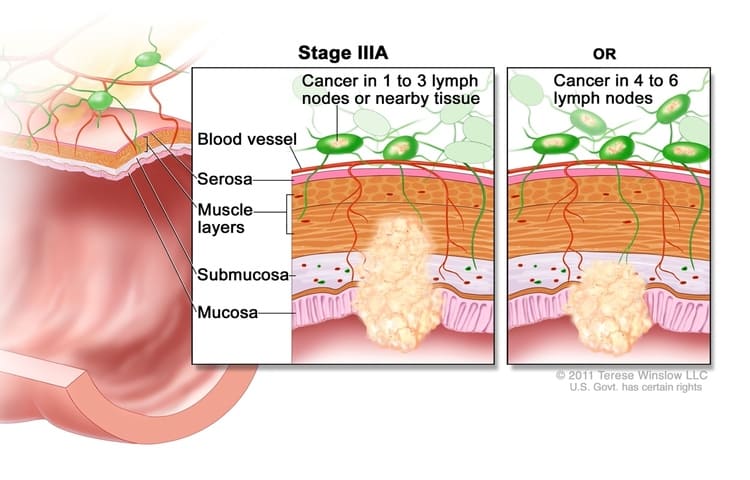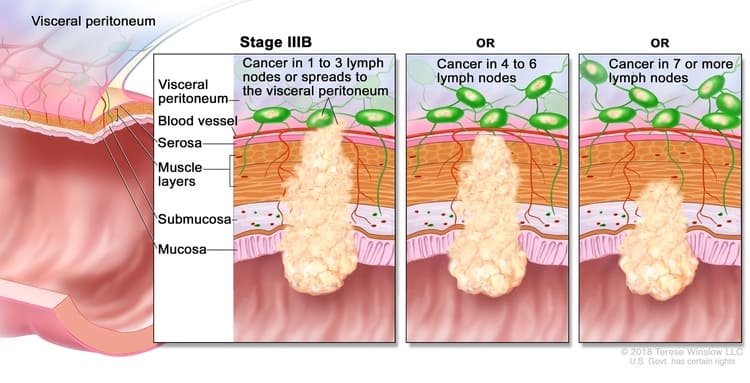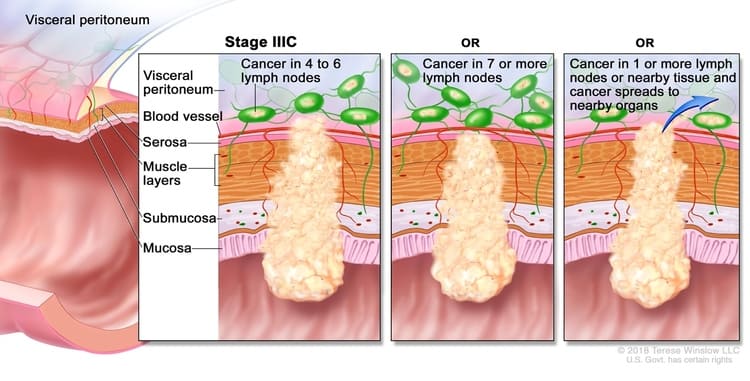Stage 3 Rectal Cancer is divided into Stages 3A, 3B and 3C. In this Stage, the cancer has spread to nearby lymph nodes, but hasn’t spread to distant body parts.
Understanding your Stage 3 Rectal Cancer diagnosis will help you partner with your doctors to make the best treatment choice for you.
Stage 3 Rectal Cancer ICD 10 is C20.
Tap “Watch Now” for an easy-to-understand overview of Stage 3 Rectal Cancer.
- Stage 3A Rectal Cancer
- Stage 3B Rectal Cancer
- Stage 3C Rectal Cancer
Overview
Stage 3A Rectal Cancer diagnosis means that:
A. The Cancer has spread to the intermediate layers of the rectum, called the submucosa or muscle and it has also affected 1-3 lymph nodes or the nearby tissue.
or
B. The Cancer is only invading the superficial layers of the rectum called the mucosa and submucosa and has affected 4-6 lymph nodes, shown here in green.
What Tests Will I Need and Why?
A Rectosigmoidoscopy (a thin tube with a camera that is introduced through your anus to see the inside of your colon) is usually the first step to identify the tumor inside your colon and take samples for analysis.
Blood and Imaging tests are done to understand your general health, confirm your diagnosis and determine your cancer stage.
Tissue analysis is also typically done through a biopsy to identify the cancer cell type, which is critical to finding the best treatment option for you.
If your treatment team has not already performed tests to determine your cancer’s features, please ask your doctor when these tests will be performed.
Re-read this summary as needed and then tap, “Compare My Treatment Options Now“. Our unique Comparison Page will help you understand your FDA-approved treatment options including, who can help you pay for your treatment, where and how each is given and what side-effects you may experience.

National Institute of Health/ treatment-rectal
Overview
Stage 3B Rectal Cancer is when:
A. The Cancer has spread to the deepest layer of the rectum (serosa) or the tissue that covers most of the organs in your abdomen (peritoneum) and has affected 1-3 lymph nodes,
or
B. The cancer has spread to the intermediate and deeper layers of your rectum called the muscle and serosa and has affected 4-6 lymph nodes
or
C. The Rectal Cancer has spread to the most superficial and intermediate layers of your rectum, the subumucosa or muscle and has affected 7 or more lymph nodes.
What Tests Will I Need and Why?
A Rectosigmoidoscopy (a thin tube with a camera that is introduced through your anus to see the inside of your colon) is usually the first step to identify the tumor inside your colon and take samples for analysis.
Blood and Imaging tests are done to understand your general health, confirm your diagnosis and determine your cancer stage.
Tissue analysis is also typically done through a biopsy to identify the cancer cell type, which is critical to finding the best treatment option for you.
If your treatment team has not already performed tests to determine your cancer’s features, please ask your doctor when these tests will be performed.
Re-read this summary as needed and then tap, “Compare My Treatment Options Now“. Our unique Comparison Page will help you understand your FDA-approved treatment options including, who can help you pay for your treatment, where and how each is given and what side-effects you may experience.

National Institute of Health/ treatment-rectal
Overview
Stage 3C Rectal Cancer is when:
1. The tumor has spread to the tissue that covers most of the organs in your abdomen called the peritoneum, and has affected 4-6 lymph nodes, shown here in green,
or
2. The tumor has spread to the deepest layer of your rectum called the serosa or the tissue that covers most of the organs in your abdomen called the peritoneum. It has also affected 7 or more lymph nodes, shown here in green.
or
3. The tumor has spread to nearby organs such as the kidney, cervix, vagina, or prostate and has affected at least 1 lymph node.
What Tests Will I Need and Why?
A Rectosigmoidoscopy (a thin tube with a camera that is introduced through your anus to see the inside of your colon) is usually the first step to identify the tumor inside your colon and take samples for analysis.
Blood and Imaging tests are done to understand your general health, confirm your diagnosis and determine your cancer stage.
Tissue analysis is also typically done through a biopsy to identify the cancer cell type, which is critical to finding the best treatment option for you.
If your treatment team has not already performed tests to determine your cancer’s features, please ask your doctor when these tests will be performed.
Re-read this summary as needed and then tap, “Compare My Treatment Options Now“. Our unique Comparison Page will help you understand your FDA-approved treatment options including, who can help you pay for your treatment, where and how each is given and what side-effects you may experience.

National Institute of Health/ treatment-rectal
Recommended Rectal Cancer Videos

Colorectal Cancer
Overview and Introduction

How Cancer Spreads
Metastatic = Advanced

Diagnosing Your Cancer
How Does a CT Scan Work?

Diagnosing Your Cancer
How Does a PET Scan Work?

Exercise! You Can Do It
Reducing Side Effects & More
Commonly Searched Questions
Stage 3 Rectal Cancer Definition
Stage 3 rectal cancers have spread to nearby lymph nodes but not to other parts of the body. Most people with stage 3 rectal cancer will be treated with chemotherapy, radiation therapy, and surgery, although the order of these treatments might differ.
Source: Cancer.org
Stage 3 Rectal Cancer Survival Rate
According to SEER data, Stage 3 Rectal Cancer has a survival rate of 72%. For example, if the 5-year relative survival rate for a specific stage of rectal cancer is 72%, it means that patients who have that cancer are, on average, about 72% as likely as patients who don’t have that cancer to live for at least 5 years after being diagnosed.
Source: Cancer.org
Stage 3 Rectal Cancer Symptoms
Rectal cancer symptoms are more noticeable in stages 3 and 4. In addition to the above symptoms, you might also experience:
- excessive fatigue
- unexplained weakness
- unintentional weight loss
- changes in your stool that last longer than a month
- a feeling that your bowels won’t completely empty
- vomiting
Source: Healthline.com
Stage 3 Rectal Cancer Recurrence Rate
According to SEER data, the stage 3 rectal cancer recurrence rate is 33% in 5 years, respectively.
Source: pubmed.ncbi.nlm.nih.gov
Stage 3 Rectal Cancer Treatment
Most people with stage 3 rectal cancer will be treated with chemotherapy, radiation therapy, and surgery, although the order of these treatments might differ.
Most often, chemo is given along with radiation therapy (called chemoradiation) first.
Source: Cancer.org
Stage 3 Rectal Cancer Prevention
Specific prevention strategies for Stage 3 Rectal Cancer are not provided. However, general recommendations to reduce the risk of colorectal cancer, which includes rectal cancer, are:
- Healthy Diet: Eat a diet rich in fruits, vegetables, whole grains, and legumes, and limit red and processed meats.
- Maintain a Healthy Weight: Achieve and maintain a healthy weight through a balanced diet and regular physical activity.
- Regular Screenings: Follow recommended screening guidelines, especially if you are at higher risk due to family history or other factors. Early detection can help manage or prevent the progression of cancer.
- Avoid Smoking: Do not smoke and avoid exposure to tobacco smoke.
- Limit Alcohol Intake: Consume alcohol in moderation or not at all.
These measures focus on reducing risk factors associated with colorectal cancer and supporting overall health. For personalized guidance and risk management, consulting a healthcare provider is recommended.
Source: Cancer.org





